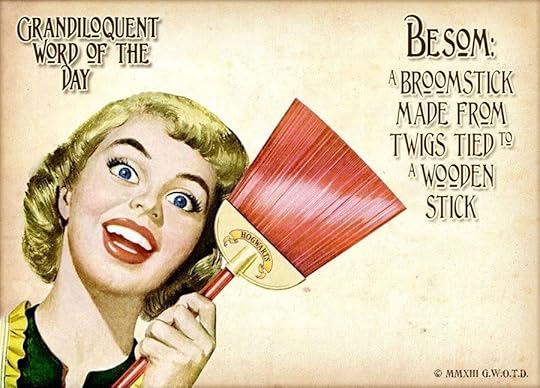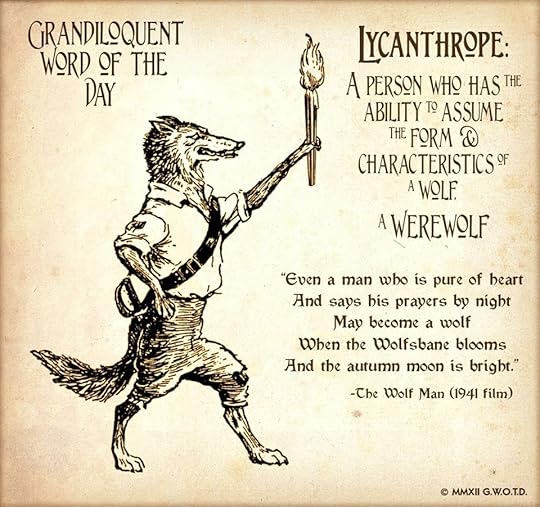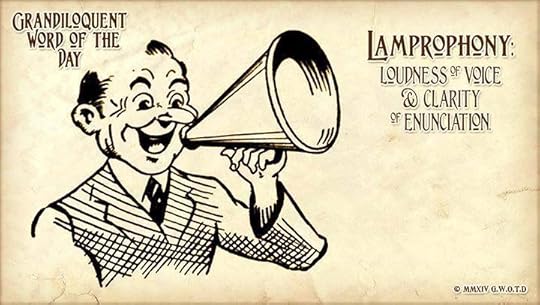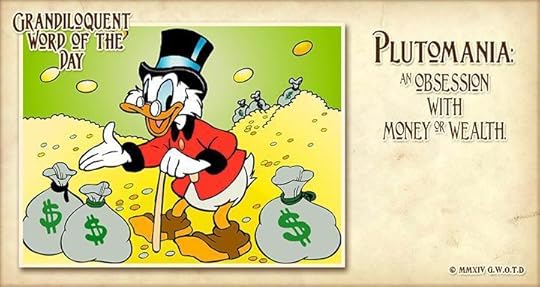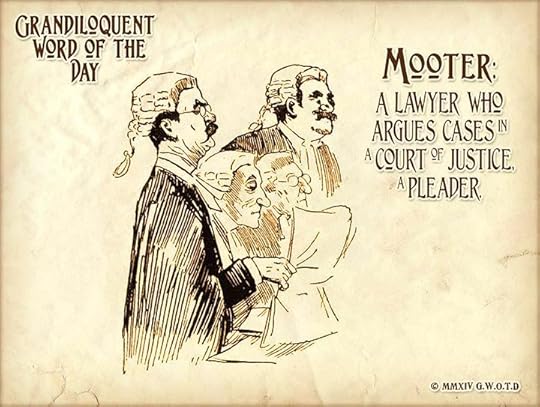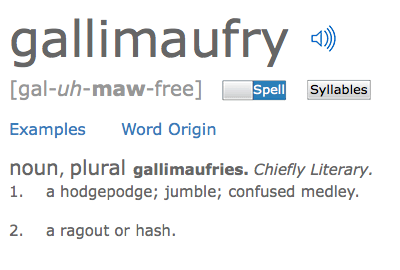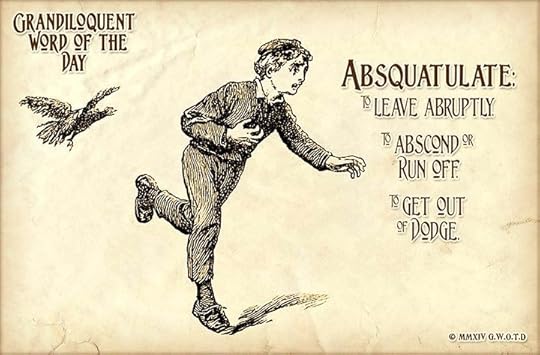Short & Sweet Treats discussion
Take a Coffee Break...
>
Word of the Day
message 1201:
by
Ƹ̴Ӂ̴Ʒ Jenn Ƹ̴Ӂ̴Ʒ
(new)
Oct 28, 2014 09:43AM


reply
|
flag
 HALLOWEEN
HALLOWEENnoun
\ˌha-lə-ˈwēn, ˌhä-\
October 31 observed especially with dressing up in disguise, trick-or-treating, and displaying jack-o'-lanterns during the evening
Variants of HALLOWEEN
Hal·low·een also Hal·low·e'en
Origin of HALLOWEEN
short for All Hallow Even (All Saints' Eve)
First Known Use: circa 1700

 CORNUCOPIA
CORNUCOPIAkȯr-nə-kō'-pē-ah
a curved goat's horn overflowing with fruit and ears of grain that is used as a decorative motif emblematic of abundance
ORIGIN:
Late Latin, from Latin "cornu copiae" horn of plenty
First Known Use: 1508
EXAMPLES:
The market is a cornucopia of fruits and vegetables.
The book includes a cornucopia of wonderful stories.
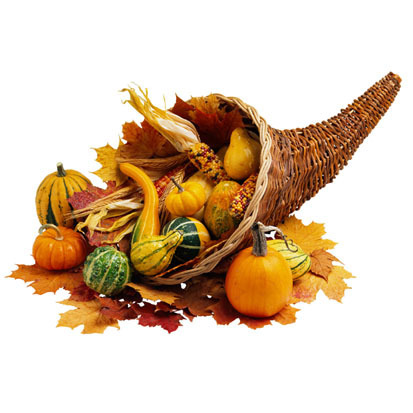
 Julia wrote: "CORNUCOPIA
Julia wrote: "CORNUCOPIAkȯr-nə-kō'-pē-ah
a curved goat's horn overflowing with fruit and ears of grain that is used as a decorative motif emblematic of abundance
ORIGIN:
Late Latin, from Latin "cornu copiae..."
I also didn't know that it originally used a goat's horn, interesting!
 golgotha
golgothaPRONUNCIATION:
(GOL-guh-thuh)
MEANING:
noun:
1. A place or occasion of great suffering.
2. A burial place.
ETYMOLOGY:
After Golgotha, the hill near Jerusalem believed to be the site of Jesus's crucifixion. From Latin, from Greek golgotha, from Aramaic gulgulta, from Hebrew gulgolet (skull). The hill was perhaps named from the resemblance of its shape to a skull. Earliest documented use: 1597.
USAGE:
"A soldier from Mississippi called Spotsylvania 'one vast Golgotha in immensity of the number of the dead.'"
Michael Ruane; 'Were Turned into Fiends and Brutes'; The Washington Post; Apr 27, 2014.

Golgotha, Jerusalem
 dragoman
dragomanPRONUNCIATION:
(DRAG-uh-man)
MEANING:
noun: An interpreter or guide.
ETYMOLOGY:
From French dragoman, from Italian dragomanno, from Latin/Greek dragoumanos, from Arabic tarjuman, and Aramaic, from Akkadian targumanu (interpreter). Earliest documented use: 1300s. Akkadian is a now-extinct Semitic language once spoken in ancient Mesopotamia (now Iraq) and written in cuneiform. Earliest documented use: 14th century.
USAGE:
"The pig doesn't express himself in some exotic swine-dialect, the farmer has no need to summon a dragoman fluent in grunts, each understands the other perfectly."
Eric Ormsby; Ambitious Diminutives; Parnassus: Poetry in Review; 2008.
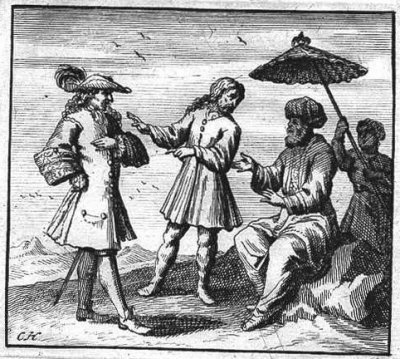
Das Osmanische Reich (Karte von ca. 1580)

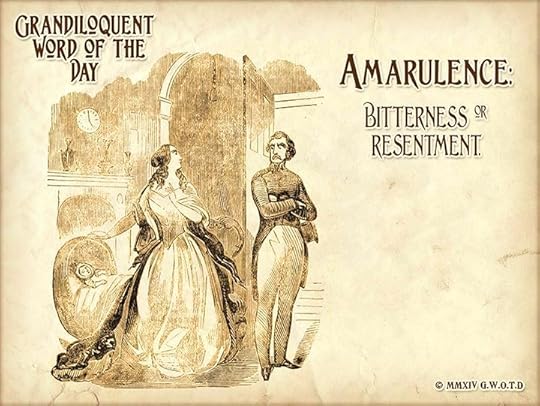
Amarulence
(uh•MAR•yew•lents)
Noun:
-Bitterness
-Anger and disappointment at being treated unfairly.
-Resentment.
Used in a sentence:
"A universal contagion, a subtle essence, fragrant as the Persian rose, hovers over their footsteps, whose hidden amarulence contaminates all that is sacred and immaculate, to breathe which is fatal."
-1861, Bracebridge Hemyng, The Dark Cloud with the Silver Lining, page 388
 Mata Hari
Mata HariPRONUNCIATION:
(MA-tuh HAR-ee, MAT-uh HAR-ee)
MEANING:
noun: A seductive woman who works as a spy.
ETYMOLOGY:
After exotic dancer Mata Hari, a stage name of Margaretha Geertruida Zelle (1876-1917). She was a Dutch woman, who took a Malay name, allegedly spied for the Germans, and was executed by the French. Her stage name Mata Hari means sun, literally "eye of the day", from Malay mata (eye) + hari (day, dawn). Earliest documented use: 1936.
USAGE:
"In London, Sophia joins the war effort ... and embarks upon improbable espionage escapades, hoping to come off as a Mata Hari in furs and printed chiffon."
Liesl Schillinger; The Persistence of Levity; Newsweek (New York); Sep 20, 2013.

Sculpture of Mata Hari
Leeuwarden, The Netherlands
 tegular
tegularPRONUNCIATION:
(TEG-yuh-luhr)
MEANING:
adjective: Relating to, resembling, or arranged like tiles.
ETYMOLOGY:
From Latin tegula (tile), from tegere (to cover). Ultimately from the Indo-European root (s)teg- (to cover), which is also the source of thatch, deck, detect, tog, and protege. Earliest documented use: 1828.
USAGE:
"The town council has contributed £70,000 to the scheme to pay for tegular paving to match other areas of the town centre."
Jon Bennett; Traders Angry Over Road Resurfacing Work; Kent and Sussex Courier (UK); Mar 14, 2008.

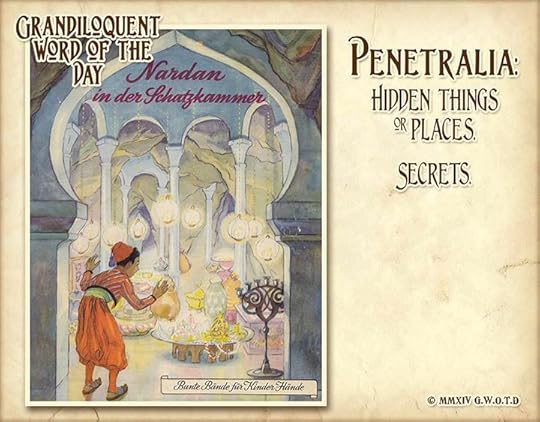
Penetralia
(pen•e•TRAY•lee•ya)
Noun:
-Hidden things or places.
-Secrets.
Used in a sentence:
"The senator was caught going to great lengths trying to hide his family's penetralia."
 frustraneous
frustraneousPRONUNCIATION:
(fruhs-TRAY-nee-uhs)
MEANING:
adjective: Useless; unprofitable.
ETYMOLOGY:
From Latin frustra (in vain). Earliest documented use: 1643.
USAGE:
"As the author of Onania expresses it, a 'frustraneous [exercise] ... center[ing] in nothing but the pleasure of sense."
Anne Elizabeth Carson; "Exquisite Torture"; Eighteenth-Century Studies; Summer 2007.
 wonted
wontedPRONUNCIATION:
(WON-tid)
MEANING:
adjective: Usual; accustomed.
ETYMOLOGY:
From Middle English woned, wont (accustomed), past participle of wonen (to be used to, dwell). Ultimately from the Indo-European root wen- (to desire or to strive for), which is also the source of wish, win, Venus, overweening, venerate, venison, and banyan, venial, and ween. Earliest documented use: 1408.
USAGE:

 I run across that one frequently in older books Jen. Don't know how many times I saw it before I finally looked it up :)
I run across that one frequently in older books Jen. Don't know how many times I saw it before I finally looked it up :)
 I do really well with looking up words with my e-reader as I don't keep a dictionary in my bedroom (I read at night).
I do really well with looking up words with my e-reader as I don't keep a dictionary in my bedroom (I read at night).
 Today, I'm posting an article: "Say What? The Literal Meanings of 30 English Words"
Today, I'm posting an article: "Say What? The Literal Meanings of 30 English Words"
http://www.huffingtonpost.com/paul-an...
Thank you for sharing this link, Jen! I especially find the literal meaning of "gymnasium" to be quite amusing! !
 WISHBONE
WISHBONE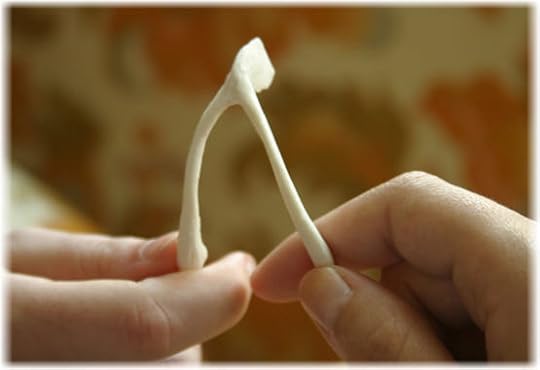
Curious where the wishbone-cracking custom came from? It all started with the ancient Romans (of course), who pulled apart chicken clavicles hoping for good fortune. The practice made it to England in the 16th century, where it was referred to as “merrythought.” In the New World, Pilgrims played tug-of-war with the bones of the more plentiful wild turkey, explains Kathleen Wall, a Colonial culinarian at the Plimoth Plantation museum, in Plymouth, Massachusetts. The term wishbone didn’t emerge until the mid-1800s, around the time President Lincoln declared Thanksgiving a national holiday. What hasn’t changed is the rules: Each person grabs an end and gives a yank. If you get the bigger piece, your wish will be granted—maybe even in a snap.
http://www.realsimple.com/holidays-en...
Thank you Julia. This just gave me an idea for Thanksgiving. I will leave a piece of Thanksgiving trivia at everyone's table setting!
 Great idea, Laura. I checked on the word "merrythought" and found this:
Great idea, Laura. I checked on the word "merrythought" and found this:"But merrythought was still the more common term in America and Britain until about 1900. Here’s an American example, from Mrs. Goodfellow’s Cookery as it Should Be, published in Philadelphia in 1865:
Remove the merrythought and neck bones next, this you will accomplish by inserting the knife and forcing it under the bones, raise it and it will readily separate from the breast.,
The name of wishbone comes, of course, from the folk custom in which two people hold its ends and pull, the one left with the longer piece making a wish. Merrythought refers to an older version of the custom, in which it is assumed that the one left with the longer piece will get to marry first. So the bone-pulling ceremony resulted in what were euphemistically called “merry thoughts” among those taking part. This explains the reference in Jack Hinton, the Guardsman, an 1843 novel by the Irish writer Charles Lever: “Simpering old maids cracked merry thoughts with gay bachelors”.
 LaLaLa Laura wrote: "Thank you Julia. This just gave me an idea for Thanksgiving. I will leave a piece of Thanksgiving trivia at everyone's table setting!"
LaLaLa Laura wrote: "Thank you Julia. This just gave me an idea for Thanksgiving. I will leave a piece of Thanksgiving trivia at everyone's table setting!"What a good idea Laura!
oh thanks Greg. I habe done things like trivia games that pertain to whichever holiday I am hosting. you can even do a prize to the winner
 Julia wrote: "WISHBONE
Julia wrote: "WISHBONECurious where the wishbone-cracking custom came from? It all started with the ancient Romans (of course), who pulled apart chicken clavicles hoping for good fortune. The practice made i..."
Very interesting, thank you for sharing!


Elflock
(ELF•lahk)
Noun:
-Tangled hair, as if matted by elves.
Used in a sentence:
"My bedhead is such an elflock, it takes 25 minutes to brush it out!"
 gemeinschaft
gemeinschaftPRONUNCIATION:
(guh-MYN-shaft)
MEANING:
noun: Social relations based on personal ties, affection, kinship, etc.
ETYMOLOGY:
From German Gemeinschaft (community), from gemein (common) + -schaft (-ship). Earliest documented use: 1937.
NOTES:
The counterpart of Gemeinschaft (community) is Gesellschaft (society), that is, social relation marked by impersonal ties, such as duty to society or to an organization.
USAGE:
"As with those small-town figures, the doorman's knowledge of a person can be worrying, but it is comforting, too. The doorman is a touch of Gemeinschaft in an ever more Gesellschaft world."
James Collins; Why Doormen?; The New York Times; Apr 25, 2010.
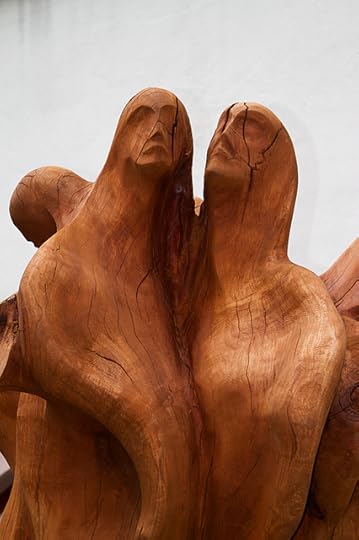
Die Gemeinschaft, a sculpture by Lackner Ferdinand, Salzburg, Austria
Photo: Sergey Smirnov
 strafe
strafePRONUNCIATION:
(strayf)
MEANING:
verb tr.:
1. To attack with machine-gun fire or bombs from a low-flying aircraft.
2. To criticize severely.
noun:
1. An attack from a low-flying aircraft.
2. A severe criticism.
ETYMOLOGY:
From the German slogan "Gott strafe England!" ([May] God punish England!) during WWI. From German strafen (to punish). Earliest documented use: 1915.
USAGE:
"Alanis is strafed with scorn no matter what she does, and her attachment parenting style is often derided on Internet sites."
Bruce Ward; Alanis at 40; Ottawa Citizen (Canada); May 21, 2014.
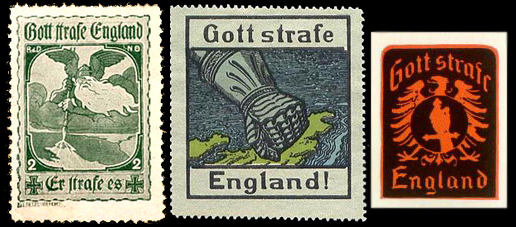
An unofficial stamp produced in Germany during WWI
Photo: Wikimedia
 gleichschaltung
gleichschaltungPRONUNCIATION:
(GLYK-shalt-toong)
MEANING:
noun: The forced standardization of political, economic, and cultural institutions, as in an authoritarian state.
ETYMOLOGY:
From German gleichschalten (to bring into line), from gleich (same) + schalten (to switch, turn). The term was used by the Nazi regime for totalitarian control. Earliest documented use: 1933.
USAGE:
"I think they will see them as a small part of a pattern of the destruction of the independence not only of the medical profession, but of all professions, that is part of the great bureaucratic Gleichschaltung of British society."
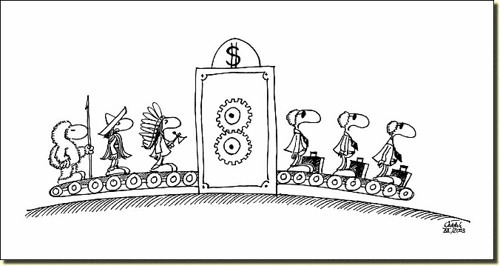
From the book Regionalwährungen by Margrit Kennedy & Bernard A. Lietaer
Cartoon: Walter Wesinger
 sitzkrieg
sitzkriegPRONUNCIATION:
(SITS-kreeg)
MEANING:
noun: A period of war marked by little or no active hostilities.
ETYMOLOGY:
Modeled after German blitzkrieg, from sitzen (to sit) + Krieg (war). Earliest documented use: 1940.
NOTES:
In Sep 1939, France and Britain declared war on Germany, but didn't launch a major ground offensive until the next year. This phase, from Sep 1939 to May 1940, came to be known as sitzkrieg or the sitting war. It has also been called by other names, such as the Phoney War, the Twilight War, and the Bore War (a pun on Boer Wars). Sitzkrieg needs sitzfleisch.
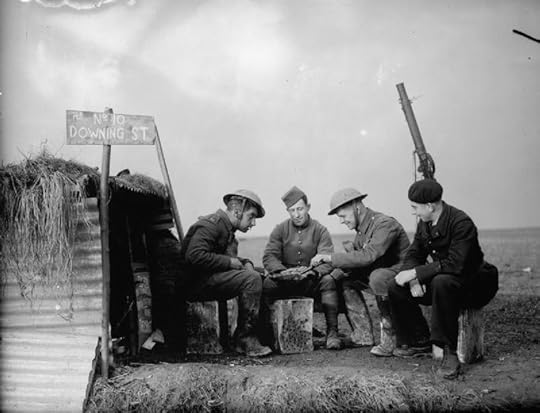
UK army personnel, Nov 28, 1939
Photo: Lt. Keating G.
 EMACITY
EMACITYA fondness for buying things

Need to be careful of this, especially on Black Friday! I much prefer "Small Business Saturday" :-)
 Yay, Jen--looking forward to my small downtown tomorrow :-)
Yay, Jen--looking forward to my small downtown tomorrow :-)"Small Business Saturday is an American shopping holiday held on the Saturday after U.S. Thanksgiving during one of the busiest shopping periods of the year. First observed on November 27, 2010, it is a counterpart to Black Friday and Cyber Monday, which feature big box retail and e-commerce stores respectively. By contrast, Small Business Saturday encourages holiday shoppers to patronize brick and mortar businesses that are small and local. Small Business Saturday is a registered trademark of American Express corporation."

 Since I own a small antique and craft shop, I must say that we are slower than slow today, but we will be bustling tomorrow. :D
Since I own a small antique and craft shop, I must say that we are slower than slow today, but we will be bustling tomorrow. :D
 Sandy wrote: "I like that concept, Julia. We shop almost exclusively at our local small businesses all year round -- both brick-and-mortar businesses in local small towns, and also at a couple of weekly markets."
Sandy wrote: "I like that concept, Julia. We shop almost exclusively at our local small businesses all year round -- both brick-and-mortar businesses in local small towns, and also at a couple of weekly markets."That's great Sandy, Julia, and Jen!
 Never heard or seen that one. Though I've always liked abscond.
Never heard or seen that one. Though I've always liked abscond.My daughter is studying vocabulary for SAT and ACT tests, and you all have helped my vocabulary tremendously!
Books mentioned in this topic
The Clicking of Cuthbert (other topics)The Crucible (other topics)
A History of Modern Drama, Volume I (other topics)
Toy Stories: Photos of Children from Around the World and Their Favorite Things (other topics)
The Book of Life (other topics)
More...
Authors mentioned in this topic
Leo Tolstoy (other topics)P.G. Wodehouse (other topics)
Leonardo da Vinci (other topics)
Theodore Roethke (other topics)
David Krasner (other topics)
More...


